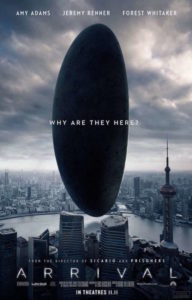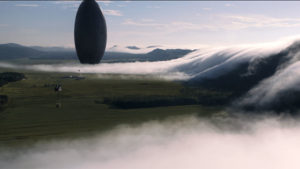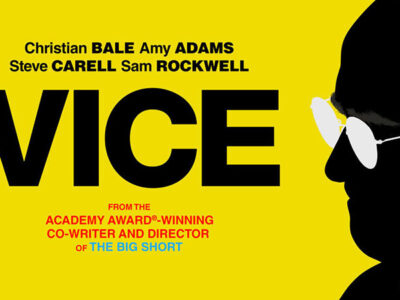Review| Arrival and the Importance of Patience in Communication
 “Language is the foundation of civilization and the first weapon drawn in a conflict.”
“Language is the foundation of civilization and the first weapon drawn in a conflict.”
Those words are from a book written by the lead character in Arrival, Dr. Louise Banks, but more than that, they abridge much of what the film is about.
Amy Adams shines as Louise, an expert in her field of linguistics and communication. When we meet her, she appears to be in mourning over the loss of her child and living a single life, cut off from everyone. Even the students in her university class don’t seem particularly connected to her.
When twelve alien pods arrive on the surface of Earth, things change. We find out she has a tie to the military with high-level clearance. She is approached by Colonel Weber (Forest Whitaker) and he offers her a position to help decipher the language of the beings presently living in the monolithic spacecraft. She then journeys to Montana where she is joined by a gaggle of military professionals, as well as theoretical physicist Ian Donnelly (Jeremy Renner).
I really loved Louise as a character. She is a solid heroine, the kind I’ve been waiting for. Why? Because she’s subtle. Though she exerts authority in her field and tells it like it is, she also presents a strong, intelligent case for her methods with a level head and an even temper in the face of staunch military personnel. One of my favorite moments is when she tells Colonel Weber the story of the word “Kangaroo” and how the English misinterpreted the Aboriginal word to be for the marsupial, when it really means, “I don’t understand.” When Colonel Weber leaves the room she reveals to Ian that she made the story up, but it proved her point nonetheless.
Anyone who has learned a new language finds out pretty early on that you cannot rush the process, understanding takes time. The backbone of the film is Louise and how she reveals to her team, and eventually the world, the importance of patience and vulnerability in communication. While trying to communicate with the aliens (referred to by humans as heptapods), nations across the world all take the same approach. It’s guns up and defense on. Louise shows us a different way.
It begins the moment she removes her hazmat suit and lets the heptapods see her as she is. When you are trying to communicate with someone, body language is a massive amount of what you process. It also demonstrates openness, showing all your cards, which in turn makes you more trustworthy and approachable. Louise continually takes steps to become more intimate with the alien beings from going hazmat free, to placing an open palm on the transparent wall that separates them, to telling them her name. She removes barriers both literal and figurative, which is not only a great way to start a conversation, it’s a great way to start a relationship too. 
This was not the approach of the American military or any military for that matter. I thought it was interesting that the Chinese government in this scenario spoke to the heptapods through mahjong tiles. However, Louise points out the obvious problem in that method as you are teaching how to converse only in terms of a game, of conflict. The idea boils down to if you give them a hammer, suddenly everything is a nail.
The presupposition of this film is something I think all of us understand, but rarely stop to think about, that conflict is our default mode. We usually view strangers as instinctively untrustworthy, and our introductions are often met with defenses high, or with a guise that hides who we truly are. Louise Banks lays herself bare and takes great risk to reach these unknown beings. In turn, they reward her with cooperation and an immeasurable gift.
We also see the consequences of breaking that trust by assuming conflict and then acting on it. A few of the soldiers go rogue out of fear and put explosives in the spacecraft, not knowing Louise and Ian are coming for another session with the heptapods. The heptapods save them from the explosion, but this act of violence results in their craft moving further into the sky, creating distance between themselves and the people of earth, thus making connection and interaction far more difficult.
It’s at this point that the story starts to crumble. After a visually beautiful and powerful face to face encounter with the heptapods in their own atmosphere and environment, Louise realizes that as she has been learning and understanding their language, she has been opening her mind up to the fifth dimension. In this dimension, time is non-linear and therefore conversation and memories can exist at different points in time and yet all at once. This is a neat concept, but it gets very muddled and tacked on in the third act, which left me pretty unconvinced when the credits rolled.
Arrival also feels a little derivative of other recent pictures, such as Gravity and Interstellar, and even The Tree of Life. However, those films had a deeper emotional influence on me than this one did. I felt that the emotional aspects involving Louise’s daughter and her struggle with those memories tried a little too hard to make me feel something, whereas in Gravity I was much more genuinely drawn to Ryan Stone and the loss of her daughter, even though you never see a single image of the child on screen.
Though explored in its own way, Arrival’s fifth dimension theory fell kind of flat for me post-Interstellar. I fully believe films can explore the same ideas and not be too similar, but Arrival had several moments where I felt like I had just seen the same thing delivered better elsewhere, and it kind of dulled the experience for me. 
Additionally, there are a lot of unanswered questions I felt were important enough to address. For example, Louise is revealed to be special in the end, and it’s because of her and her expertise that in 3,000 years Earth will come to aid this heptapod species. However, there isn’t any real exposition on why she of all the people on earth is the one they chose. They brought twelve pods to earth, but if they wanted to reach Louise, then they really only needed one. Moreover, why do the people of Earth assume that these beings are here for violence and destruction when it’s quite plain that, if they wanted to destroy us, they would have done so directly? The study and interactions with the heptapods go on for months. They could have had many opportunities to wipe us out if that’s what they wanted, but in the grand scheme of alien film tropes, it comes back down to ignorant assumptions of violence and war.
For me, the film was fascinating when it focused on the scenes of Louise and Ian communicating with the heptapods and working together to decipher their language. As more is revealed in regard to the fifth dimension theory and the reasons behind Louise’s visions, it becomes more difficult to be invested and believe the narrative. I have not read the source material, Story of Your Life by Ted Chiang, but I have to wonder if it might also be the source for the story’s unanswered questions and inconsistencies.
Though I did enjoy this film for its unique approach to alien contact and the use of language as both a science and an art, I think I would ultimately rather turn to the others I mentioned for a rewatch. I quite enjoy Denis Villeneuve’s muted and minimalistic direction, but overall his other films are far more novel and organic than this one. Arrival is a promising and interesting flight, but it doesn’t quite stick the landing.







Pingback: How ‘Arrival’ Affirms a Christian Worldview | Reel World Theology
Pingback: How "Arrival" Affirms a Christian Worldview - A Clear Lens